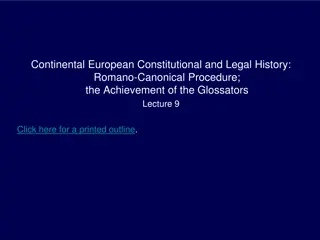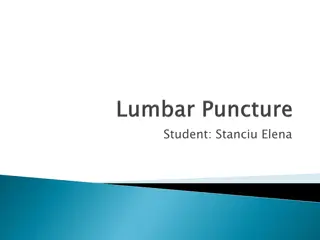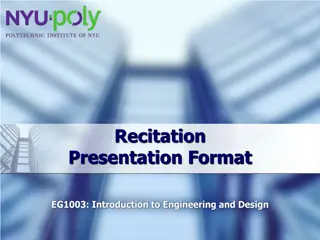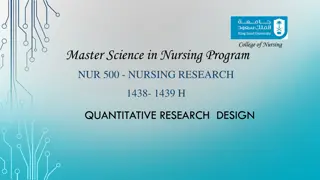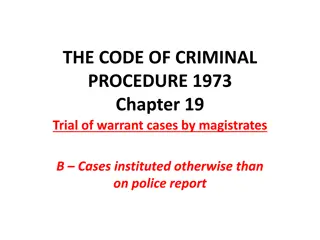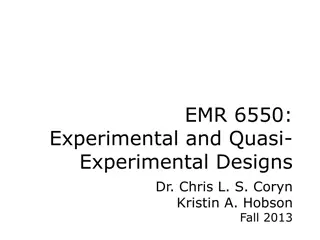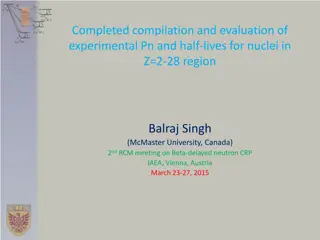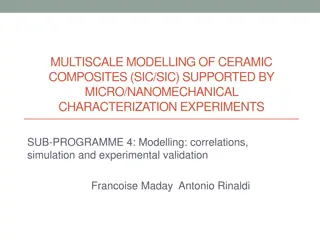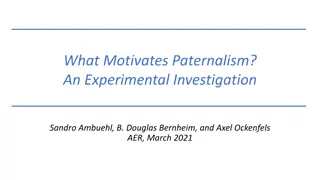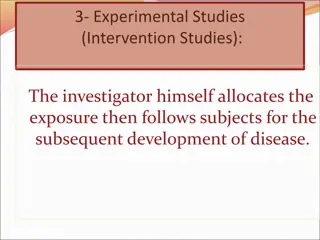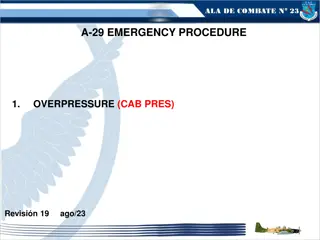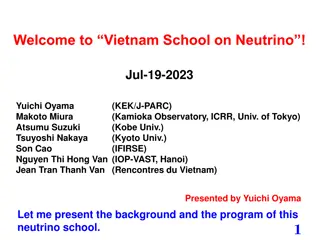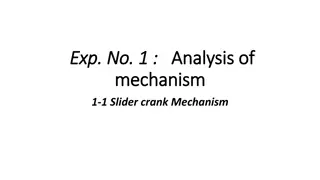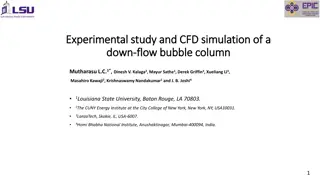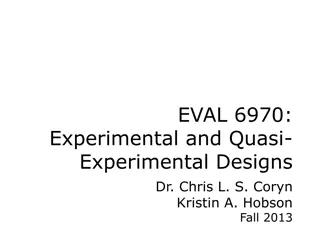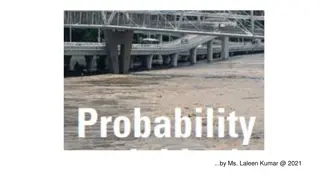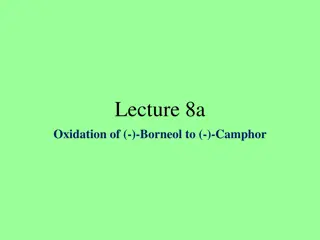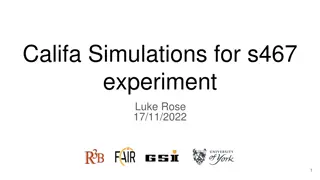Parliamentary Procedure
Learn about the role, principles, and importance of parliamentary procedure in running effective meetings. Explore the basics of Robert's Rules of Order, agenda building, the relationship between parliamentary procedure and the Brown Act, and tools for chairs to facilitate discussions and decision-m
1 views • 25 slides
Introduction to Experimental Economics by John Hey: A Comprehensive Overview
Explore the interconnected realms of Experimental Economics and Behavioral Economics through the insightful lectures of John Hey, an Emeritus Professor at the University of York. Discover the methodology of testing economic theories for validity and the practical applications of experimental economi
1 views • 58 slides
Insights on Experimental ASF Vaccines in Pig Studies
The research conducted by Prof. Jishu Shi and his team at Kansas State University delves into the safety and efficacy testing of experimental African Swine Fever (ASF) vaccines using pigs as the model. Various vaccines, including DNA vaccines and live attenuated viruses, were tested against differen
4 views • 13 slides
Doula Billing Procedure Update for Oregon Health Plan Providers
Understand the new billing procedure for doula services under the Oregon Health Plan, including the new procedure code T1033, modifiers HD and 22, and the importance of the update. Learn about correct billing and coding, global billing examples, and different billing scenarios for doula services. Qu
2 views • 8 slides
Overview of Common Procedure for Requesting COAMU Advice
This content provides information on the common procedure for requesting COAMU advice in the Brabant Wallon, Hainaut, Namur, Liège, and Luxembourg regions. It covers topics such as the legal basis, reasons for procedure reform, principles of the new procedure, and steps for implementation. Key poin
10 views • 16 slides
Harvard Procedure Guidelines and Rules for Model United Nations
In this guide, you will explore the rules and procedures specific to the Harvard Procedure in Model United Nations. It covers general rules, guidelines on resolutions and voting, language requirements, courtesy expectations, rules of procedure, motions, points of order, and parliamentary inquiries.
6 views • 20 slides
Understanding Parliamentary Procedure for Effective Meetings
Parliamentary procedure is a set of rules and customs that govern meetings in various organizations. This system ensures fair and efficient decision-making by outlining the proper conduct of meetings, including making and handling motions, and the role of the presiding officer. By following parliame
0 views • 21 slides
IEEE 802.11-21/1321r1 WLAN Sensing Procedure Proposal
This document by Solomon Trainin from Qualcomm presents a proposal on aligning the SFD for the WLAN sensing procedure. It aims to resolve contradictions, optimize behavior, and introduce a structured WLAN sensing procedure. The content outlines phases, terminology, setup, measurement, and reporting
0 views • 8 slides
Understanding Nonexperimental and Quasi-experimental Studies
Nonexperimental and quasi-experimental studies resemble experiments but lack random assignment, making them valuable for group comparisons without establishing causation. This type of research design looks at differences between groups that already exist, focusing on group differences rather than ca
1 views • 35 slides
Understanding Experiments in Research: Observation vs. Experimentation
Observation and experiments are two crucial methods in research. An observational study involves observing and measuring variables without influencing responses, while an experiment deliberately applies treatments to measure responses. Confounding variables can affect the results, and factors like e
0 views • 13 slides
Understanding Experimental Psychology: Designs and Control Issues in Research
This content delves into the basics of experimental research, focusing on different types of experimental designs and control issues. It covers between-group and within-group designs, discussing advantages and disadvantages, as well as methods for controlling for nonequivalence. The importance of ra
0 views • 26 slides
Tepid Sponging Procedure in Patient Care
Tepid sponging is a technique used to reduce body temperature in patients with fever. This procedure involves applying lukewarm water to the skin surface to promote heat dispersal. Key steps include preparing the patient, collecting equipment, sponging with tepid water, and monitoring the patient's
0 views • 7 slides
Worksafe Procedure NR/L2/OHS/00112 Safety Hour Overview
The Worksafe Procedure NR/L2/OHS/00112 was introduced in 2009 to empower Network Rail employees to raise safety concerns and stop work if necessary. This procedure ensures a safe work environment by allowing employees to assess risks, establish safe work practices, and receive support from managemen
0 views • 8 slides
Briefing on the Criminal Procedure Amendment Bill [B12-2021] to the Portfolio Committee on Justice and Correctional Services
The Criminal Procedure Amendment Bill aims to address the constitutional invalidity of section 154(3) of the Criminal Procedure Act by enhancing protection for child victims, accused, and witnesses in criminal proceedings. The Bill proposes prohibiting the publication of information revealing their
0 views • 12 slides
Understanding Probability: Experimental and Theoretical Concepts
Probability is the measure of the likelihood of an event happening, with experimental and theoretical probability being key concepts. Experimental probability involves determining probabilities through experience or experiments, while theoretical probability can be calculated without prior experienc
2 views • 23 slides
Evolution of Procedural Law in Continental European Legal History
The journey of procedural law in Continental European legal history, from the challenges faced by glossators in creating Romano-canonical procedure to the discussions on canonic procedure in canon law. Explore the intricacies of legal procedure development and the influences of historical texts such
0 views • 36 slides
Lumbar Puncture: Procedure, Complications, and Clinical Applications
Lumbar puncture, also known as LP, is an invasive procedure used to obtain cerebrospinal fluid (CSF) for diagnostic and therapeutic purposes. This procedure has a long history dating back to ancient times, with modern techniques developed in the late 19th century by Heinrich Quincke. LP is crucial f
2 views • 11 slides
Lumbar Puncture: Indications, Contraindications, and Post-procedure Considerations
Lumbar puncture is a medical procedure involving the insertion of a needle into the spinal subarachnoid space to collect cerebrospinal fluid for diagnostic or therapeutic purposes. Indications for performing a lumbar puncture include suspicion of meningitis, subarachnoid hemorrhage, CNS diseases lik
0 views • 17 slides
Understanding Procedure Texts and their Structure
Procedure texts are instructional pieces of writing that explain how something works or how to perform a specific activity. They typically consist of three main definitions: texts that explain how to use something, texts that provide instructions for a particular activity, and texts that address hum
0 views • 10 slides
Quiz Review on Scientific Method and Graphing
Explore a quiz review covering topics related to scientific method, graphing, and experimental design. Understand key concepts such as hypothesis, scientific law, theory, variables, and experimental control through detailed questions and images. Test your knowledge on laboratory safety, inferences,
0 views • 14 slides
Guidelines for Lab Presentation Format
Lab presentations should be concise, lasting about 5 minutes, followed by feedback. Each presentation should have a title slide, overview, experimental objective, introduction, background information, materials, procedure, data/observations, and conclusion. The team must discuss the experiment's goa
0 views • 23 slides
Understanding Quantitative Research Designs in Nursing
Delve into the world of quantitative research in nursing, exploring different research designs and the concept of causality. Learn about experimental, quasi-experimental, and non-experimental designs, as well as the characteristics of experimental design like manipulation, control, and randomization
0 views • 22 slides
Trial of Warrant Cases by Magistrates under the Code of Criminal Procedure 1973
The Code of Criminal Procedure 1973 Chapter 19 outlines the procedure for trial of warrant cases by magistrates where the prosecution presents evidence to support the case against the accused. Section 244 requires the magistrate to hear the prosecution and take all evidence presented. If the evidenc
0 views • 12 slides
Quasi-Experimental and Interrupted Time-Series Designs Overview
Explore the various quasi-experimental designs, control groups, pretests, and outcome patterns in research methodologies. Understand the implications of different outcome patterns on causal interpretation and validity threats in experimental studies.
0 views • 31 slides
Understanding Experimental Design in Biology
Explore key concepts in experimental design in biology through clicker questions focusing on hypotheses, variables, control groups, and experimental groups. Learn how scientists test hypotheses and analyze results to draw valid conclusions in biological studies.
0 views • 15 slides
Compilation and Evaluation of Experimental Data for Nuclei in Z=2-28 Region
Completed compilation and evaluation of experimental Pn and half-lives for nuclei in the Z=2-28 region, led by Balraj Singh at McMaster University. The work involved preparing lists of neutron-rich nuclides, identifying potential emitters, analyzing available experimental data for 1n, 2n, 3n, and 4n
0 views • 20 slides
Advances in Ceramic Composite Property Modeling and Experimental Characterization
European research focuses on advanced modeling of C/C, C/SiC, and SiC/SiC composites for aerospace and nuclear applications, with an emphasis on correlating simulations with experimental validation. Laboratories are progressing towards a multiscale approach, integrating micro/nanomechanical characte
0 views • 5 slides
What Motivates Paternalism? An Experimental Investigation
Centuries of normative debate on paternalism have resulted in its ubiquity in various aspects of society, from consumer protection to safety regulations. However, there is a scarcity of empirical studies on the motivations behind paternalistic interventions. This experimental investigation delves in
0 views • 12 slides
Understanding Experimental Studies: Intervention, Characteristics, and Measurements
Experimental studies involve the investigator assigning exposures and following subjects to observe disease development. Different types of experimental studies exist, such as preventive and therapeutic types, each with its limitations, including ethical concerns and challenges in recruiting subject
0 views • 13 slides
A-29 Emergency Procedure: Overpressure (CAB PRES)
An overview of the emergency procedure for overpressure (CAB PRES) in the A-29 aircraft. The procedure outlines actions to take when cockpit differential pressure exceeds 5.75 psi, including switching off the air conditioning, maintaining a maximum altitude of 25,000 ft, and following the SUPPLY FAI
0 views • 4 slides
Understanding Research Methods and Data Analysis
This review covers topics such as experimental classification, the comparison of non-experimental and experimental research, software features like JMP and SPSS, outlier handling in data analysis, and levels of measurement in statistical analysis.
0 views • 13 slides
Vietnam Neutrino School Overview
Vietnam School on Neutrino is an annual event started in 2017 to promote experimental neutrino physics in Vietnam. Led by Prof. Jean Tran Thanh Van, the school focuses on lectures, software and hardware training, group works, and excursions. With a mix of students from various countries, the aim is
0 views • 7 slides
Analysis of Slider-Crank Mechanism and Experimental Data
Slider-crank mechanism analysis involves understanding the transformation of input motion into desired output motion. This mechanism consists of a crank, coupler, slider, and ground link, converting circular motion into linear motion. Experimental procedures involve setting crank angles and recordin
0 views • 6 slides
Experimental Study and CFD Simulation of a Down-flow Bubble Column
This study and simulation focus on the experimental setup, measurement techniques, and results of a down-flow bubble column. It explores novel features such as inverted bubbly flow, micro-bubble generation, and gas injection. Detailed analysis includes axial and radial variations of volumetric gas h
0 views • 25 slides
Understanding Experimental and Quasi-Experimental Designs
Explore the foundations of experimental and quasi-experimental designs, delving into causal relationships, counterfactual reasoning, and the importance of validating statistical and internal conclusions. Learn about causes, effects, and the complexity of determining causation in research. Discover R
0 views • 46 slides
Understanding Probability: Learning Outcomes and Examples
This content delves into the study of probability, covering topics such as representing probabilities of simple and compound events, calculating relative frequencies, multi-step chance experiments, theoretical and experimental probabilities. It explains concepts like chance experiments, sample space
0 views • 31 slides
Oxidation of (-)-Borneol to (-)-Camphor: Experimental Procedure
The experiment details the oxidation of (-)-borneol to (-)-camphor using hypochlorous acid, along with purification steps. It involves the use of household bleach solution and various testing methods to ensure successful conversion. The process includes handling small amounts of reagents, monitoring
0 views • 12 slides
Understanding Experimental Studies in Epidemiology
Epidemiological studies and experimental studies play vital roles in understanding cause-and-effect relationships in research. Experimental studies involve manipulating independent variables and measuring dependent variables, with categories such as true experimental, quasi-experimental, and pre-exp
0 views • 22 slides
Califa Simulations and Experimental Observations in Nuclear Physics Research
Exploring nuclear physics research through Califa simulations and experimental observations with a focus on PID gating, clustering algorithms, beam settings, and Ca isotopes chain gating. The study involves simulating events on CH2 targets, analyzing clustering effects, and observing opening angles
0 views • 10 slides
FY25 LBS Lab OMEGA/OMEGA EP Proposed Campaign
Proposed campaign in FY25 by the LBS Lab to measure specific deliverables, compare results with experimental and theory PIs, collaborate with others, and assess technical issues such as target fabrication feasibility. The campaign involves motivation, relevant milestones, previous/simulated results,
0 views • 6 slides



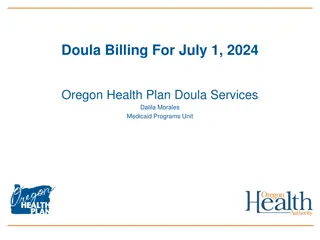

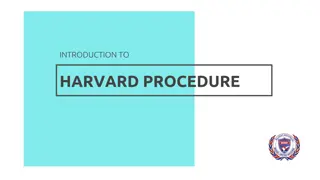

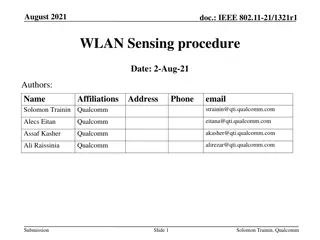
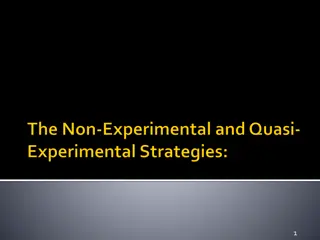
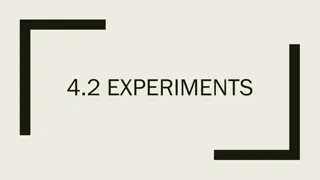
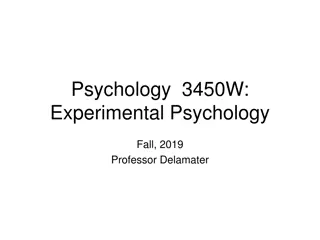
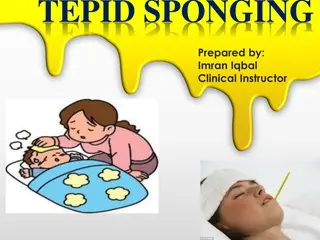

![Briefing on the Criminal Procedure Amendment Bill [B12-2021] to the Portfolio Committee on Justice and Correctional Services](/thumb/157093/briefing-on-the-criminal-procedure-amendment-bill-b12-2021-to-the-portfolio-committee-on-justice-and-correctional-services.jpg)

